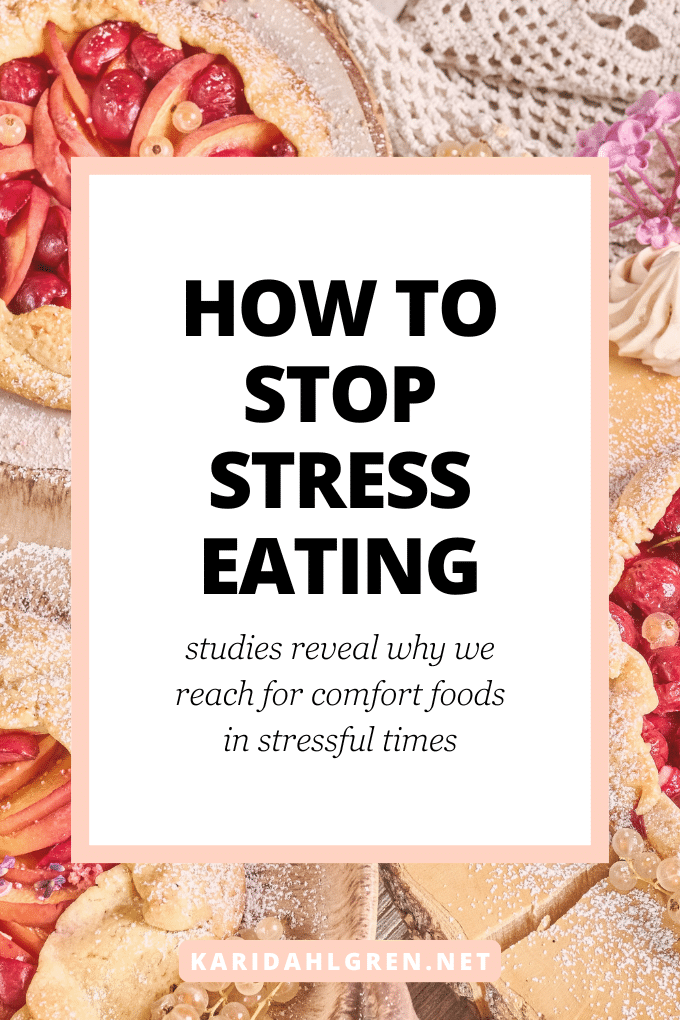
Learning how to stop stress eating may feel like an impossible task when stress sends you straight to the snack shelf. While it’s normal to seek comfort in food during stressful moments, the good news is that you can manage stress eating with practical, evidence-based techniques.
In this article, we’ll explore why stress eating happens and walk through practical, research-backed steps to help you overcome it. From managing stress to recognizing emotional hunger, you’ll learn how to navigate your triggers and develop healthier coping mechanisms for the long term.
Understanding Stress Eating
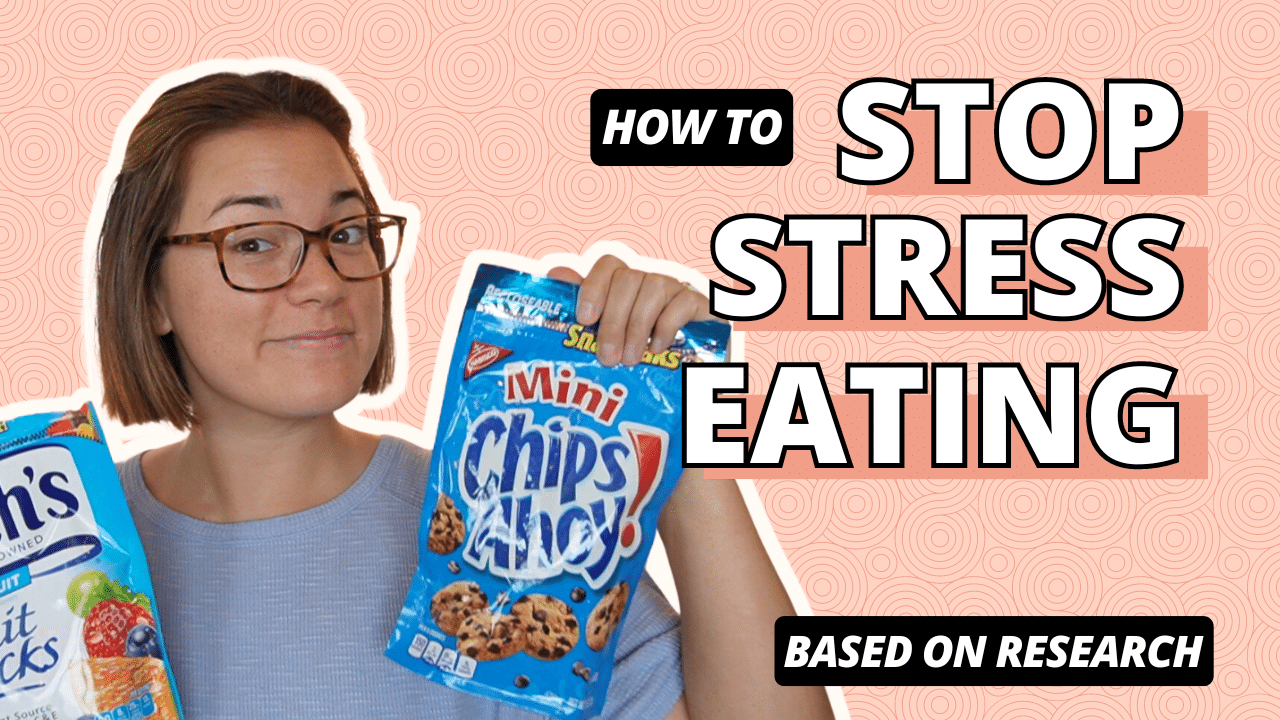
Stress eating, a type of emotional eating, occurs when we turn to food in response to stress. Unlike physical hunger, which develops gradually and can be satisfied with a balanced meal, stress eating is driven by emotional needs and the desire for comfort.
According to a study published in Foods, stress increases cravings for hyperpalatable foods, those high in sugar and fat.[1] Consuming hyperpalatable foods in the pursuit of pleasure is a type of emotional eating known as hedonic eating. It differs from stress eating in that it’s purely motivated by the pursuit of pleasure while stress eating is motivated by the desire to escape stress and seek comfort.
When stress arises, the body releases cortisol, a hormone that heightens cravings for hyperpalatable foods like sweets and junk food. According to a study published in Current Obesity Reports, stress-induced cortisol spikes are closely linked to abdominal fat accumulation, creating a vicious cycle of stress, overeating, and weight gain that’s difficult to break.[2]
But what about people who eat less in response to stress? Indeed, stress affects everyone differently. While some people may eat more when stressed, others may eat less or experience no change at all, according to research published in Minerva Endocrinologica.[3]
Stress eating can be frustrating experience, especially if you’re trying to eat foods higher in nutrients than hyperpalatable foods. The first step in learning how to stop stress eating is to identify exactly what causes it.
Why Do We Stress Eat?
Understanding the root causes of stress eating is essential because stress eating is often a coping mechanism for deeper emotional or situational challenges. Stress eating doesn’t stem from one single cause; it’s a blend of emotional, biological, and behavioral factors that vary from person to person.
Here the top causes of stress eating:
- Situational triggers: Stressful life situations, whether related to work, family conflicts, financial struggles, or health issues, are common triggers for stress eating. According to a study published in the American Journal of Clinical Nutrition, occupational burnout significantly increases emotional and uncontrolled eating, making it harder to make healthy food choices during times of chronic work stress.[4]
- Restraint: A study published in Health Psychology Review found that practicing dietary restraint (e.g. dieting, calorie counting) increases the likelihood of reaching for unhealthy foods when stressed—and overeating those foods.[5] This underscores the restrict-binge cycle, where effort to maintain strict eating backfires and causes out-of-control eating.
- Calorie counting: According to a study published in Psychosomatic Medicine, calorie counting increases perceived stress, which can exacerbate cravings and emotional eating, especially in the face of stressful events.[6]
- The brain’s reward system: According to research published in Minerva Endocrinologica, stress alters brain circuits related to reward, making it harder to resist these cravings and leading to emotional overeating.[3]
By understanding and addressing these common causes of stress eating, you can take steps toward learning how to stop stress eating and improve your relationship with food.
How to Stop Stress Eating with Evidence-Based Techniques
To effectively stop stress eating, it’s important to rely on evidence-based techniques supported by clinical research. These steps aren’t just about quick fixes—they’re grounded in science, which means they are more likely to lead to lasting changes.
Here are some steps to stop stress eating, backed by science:
1. Manage Stress Effectively
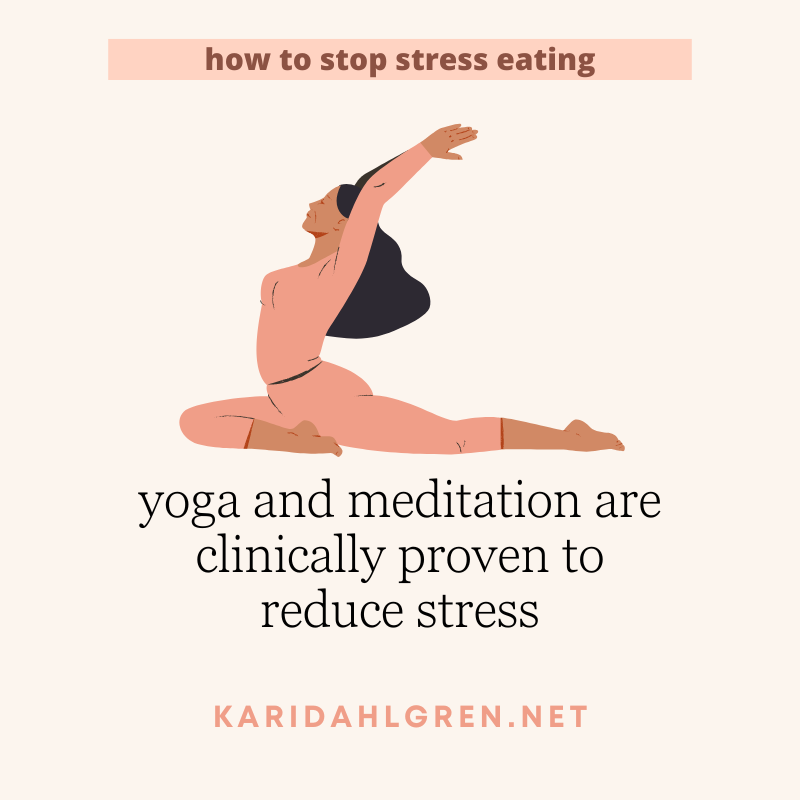
Reducing stress is the most direct factor for learning how to stop stress eating, and several evidence-based practices can help. First, consider adding stress-reducing activities to your day such as yoga and meditation, which are proven to reduce stress and improve psychological health.
A randomized controlled trial published in Anxiety, Stress, and Coping found that practicing yoga for 8 to 16 weeks significantly reduced stress, anxiety, and insomnia while increasing well-being in individuals with moderate to high stress levels.[7] Similarly, a study published in Behavioral Brain Research found that even brief daily meditation can decrease the stress hormone cortisol and improve mood, attention, and emotional regulation.[8]
2. Listen to Your Body Instead of Food Rules
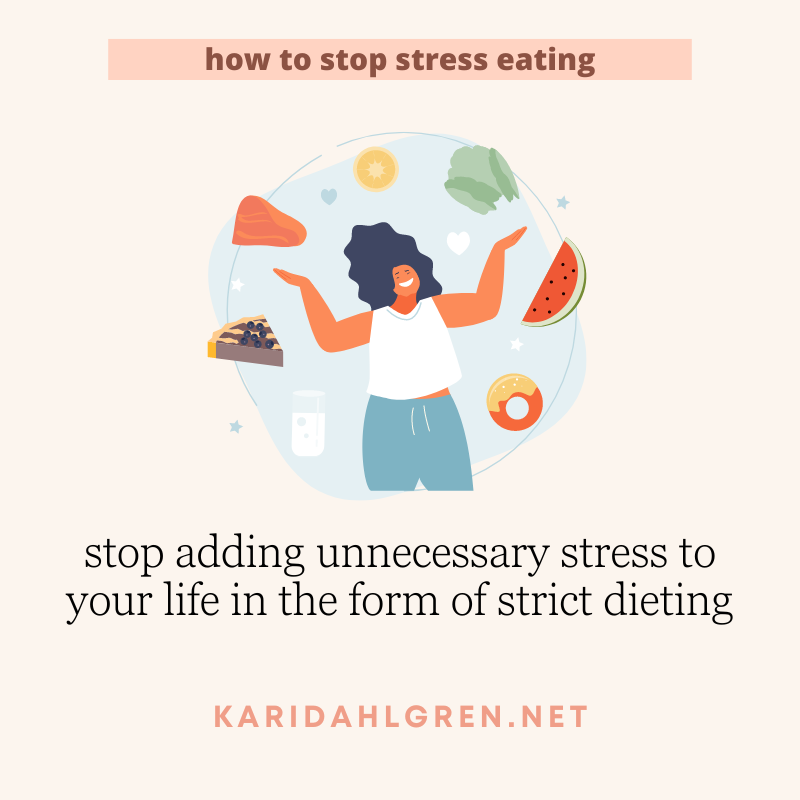
Research has shown that dietary restraint, or the act of consciously restricting food intake, increases stress eating, as found in a study published in Health Psychology Review.[5] Therefore, a key step in learning how to stop stress eating is letting go of restrictive food rules and instead focusing on listening to your body’s natural hunger and fullness cues.
External rules often trigger a restrict-binge cycle, where restriction heightens cravings and leads to overeating, especially during stress. Shifting to intuitive eating helps break this cycle. According to a Journal of the Academy of Nutrition and Dietetics review, intuitive eating improves physical and psychological well-being, boosting body satisfaction, reducing anxiety, and fostering healthier eating habits.[9] By honoring your body’s signals, you create a sustainable, balanced approach that supports long-term health and emotional well-being.
3. Create New Coping Mechanisms
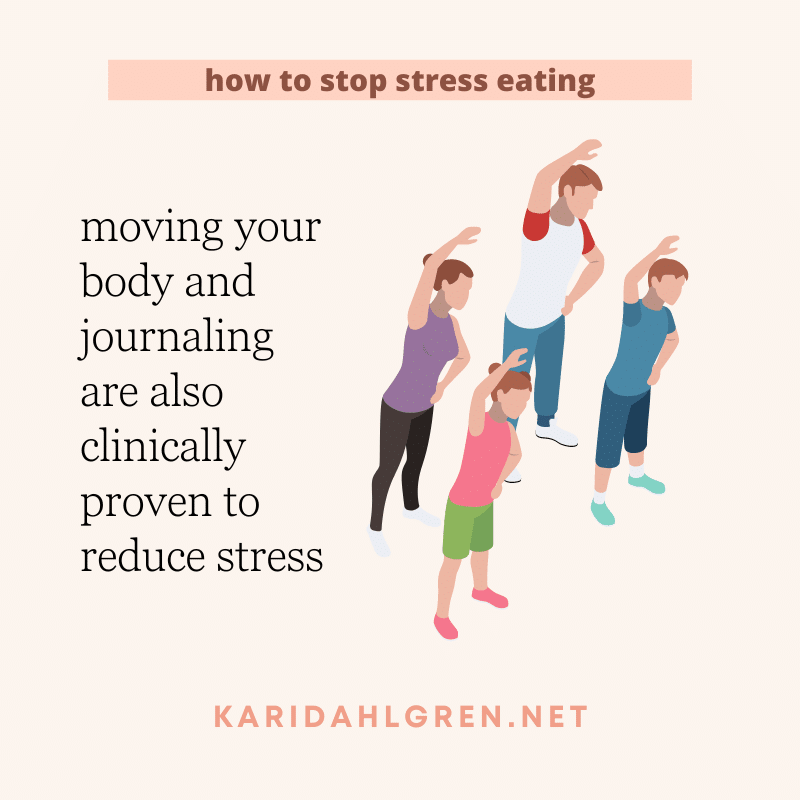
Stress eating is sometimes the result of lacking healthier outlets for stress relief. By creating new non-food coping mechanisms, like exercise, journaling, deep breathing, or meditation, you can shift your response to stress away from food.
Research from The British Journal of Health Psychology shows that physical activity (any movement of the body that results from skeletal muscles using energy) reduces stress and negative emotions while boosting positive mood.[10] You don’t have to exercise in a gym to benefit from physical activity—even a walk around the block helps, and it is more accessible during a stressful work day.
On the same note, a study in JMIR Mental Health found that positive affect journaling (15-20 minutes of writing about challenging experiences) significantly reduced anxiety and improved well-being, offering a simple, accessible tool for stress relief.[11] Building a personalized self-care toolkit can help you to learn how to stop stress eating by decreasing stress through healthy outlets.
4. Practice Mindful Eating
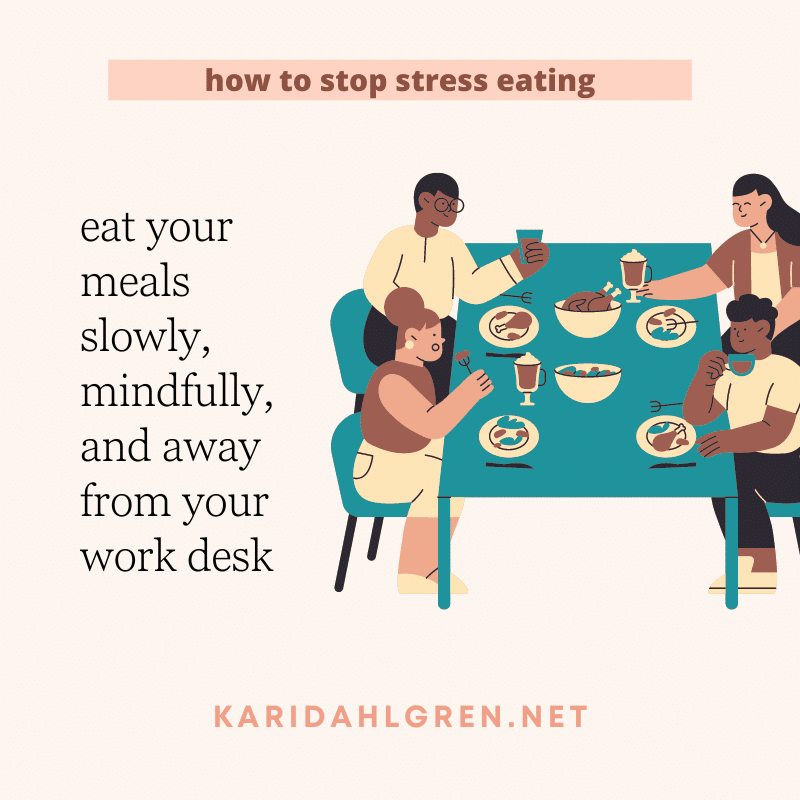
Mindful eating involves slowing down, savoring each bite, and eating without distractions. Studies have shown that slowing down when eating can reduce energy intake and increase feelings of fullness. One study published in the Journal of the American Dietetic Association found that women who ate slowly consumed fewer calories and experienced greater satiety compared to those who ate quickly.[12]
Additionally, a review in Integrative Medicine highlights how mindful eating can help ease the effects of stress on digestion by activating the parasympathetic nervous system, which is essential for keeping your digestion running smoothly.[13] By eating your meals away from a stressful environment and without distraction, you can reduce stress eating patterns and tune in more effectively to your body’s natural hunger and fullness cues.
How to Stop Stress Eating by Navigating Emotional Factors
To truly learn how to stop stress eating, it’s essential to navigate all emotions, not just the stressful ones. Often, we turn to food as a quick fix for emotions like anger, sadness, loneliness, or boredom, seeking comfort in the short term. However, when we don’t address the underlying emotions, stress eating becomes a cycle.
Here are some steps for navigating emotional triggers around food:
5. Identify Emotional Hunger
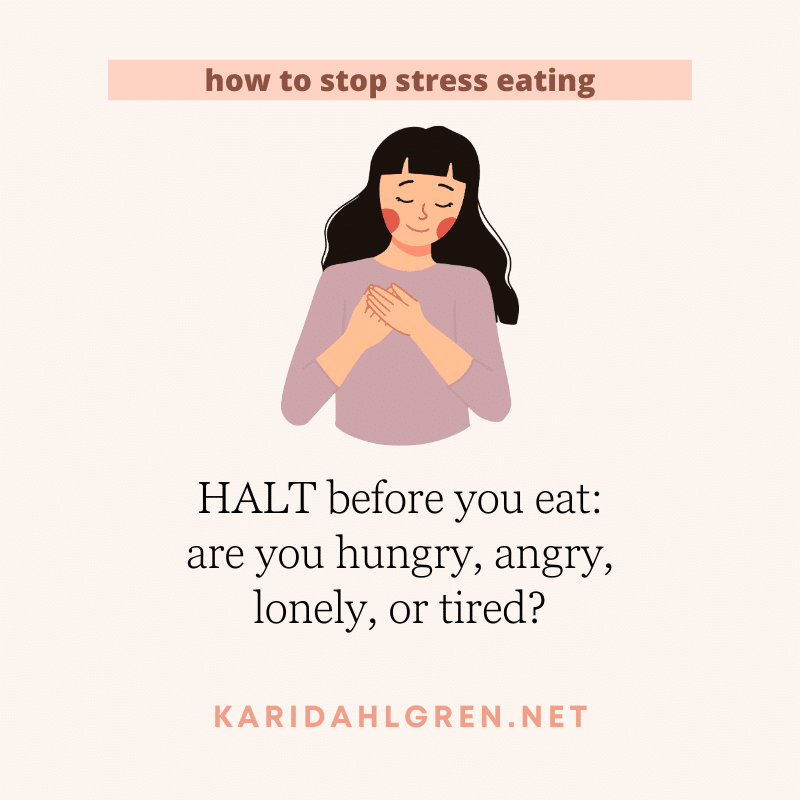
A crucial first step in managing stress eating is learning to differentiate between physical hunger and emotional hunger. Physical hunger develops gradually and can be satisfied by any nourishing meal, while emotional hunger is sudden and often linked to cravings for specific comfort foods.
The HALT method—standing for Hungry, Angry, Lonely, and Tired—offers a simple yet effective way to pause and assess your emotional state before eating. By recognizing whether your hunger is physical or emotionally driven, you can make more mindful decisions that align with your body’s needs.
6. Try the ‘Stop, Drop, & Feel®’ Technique
The Stop, Drop, & Feel® is a tool that I created to help reduce emotional eating by promoting emotional awareness and emotional tolerance, the ability to withstand distressing emotions without resorting to compulsion.
Here’s how it works:
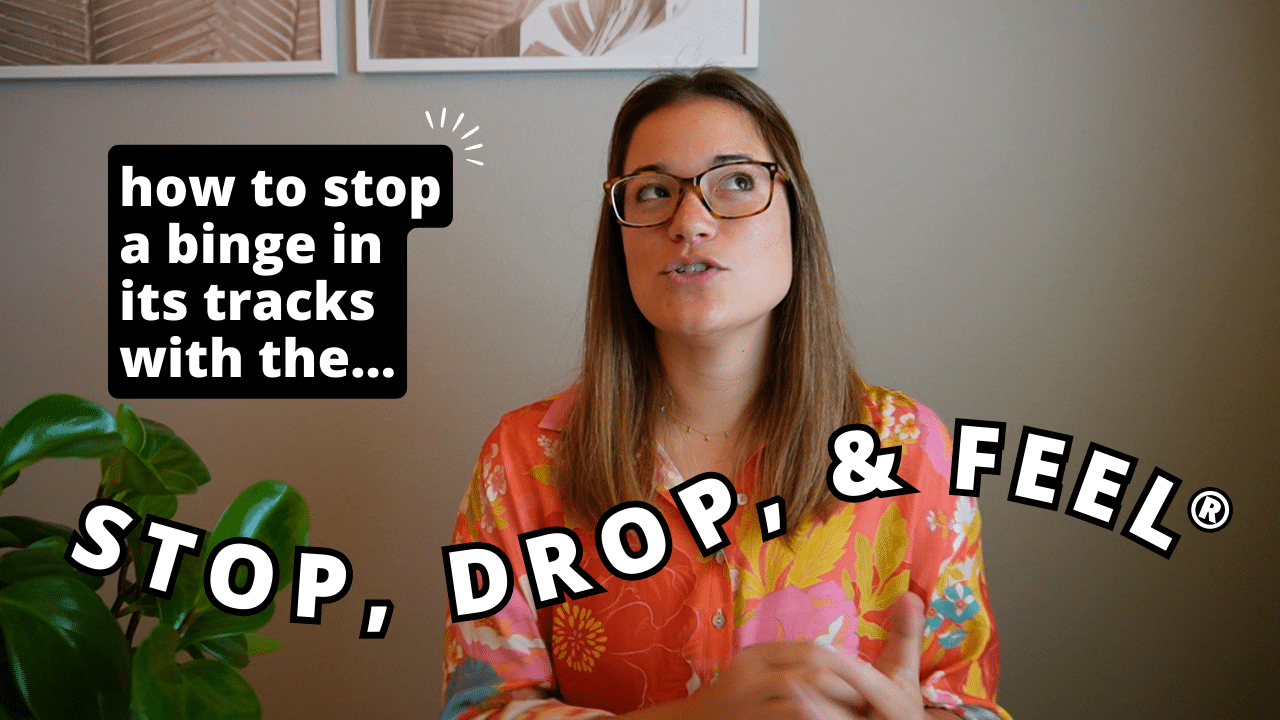
When you notice the urge to stress eat, this practice encourages you to stop what you’re doing, drop into your emotions, and fully feel them without judgment or resistance. By holding space for stressful emotions, you gradually develop tolerance for them, which can help stop out-of-control eating like stress eating. A study published in Eating Behaviors found that as emotional tolerance increases, loss-of-control eating behaviors decrease.[14]
Keep in mind that learning how to stop stress eating isn’t about gritting your teeth and pushing through unhealthy levels of stress. The key is to find a balance: reducing overall stress—like taking a break for a walk during a hectic workday—while also building emotional self-regulation skills. These skills will help you manage the urge to stress eat when it inevitably arises, allowing you to respond in healthier ways.
7. Embrace Self-Compassion
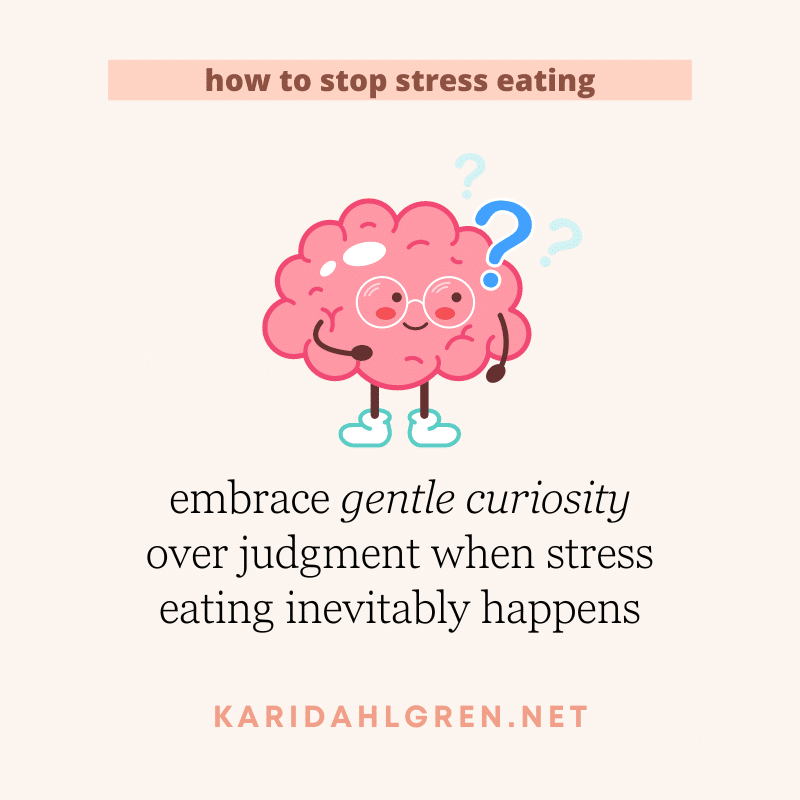
Slip-ups are an inevitable part of the journey toward healthier eating habits, but they don’t define your success. Instead of viewing stress-eating moments as failures, see them as opportunities for growth. Each time you face a setback, it’s a chance to reflect on what triggered the emotional eating and how you can respond differently next time. By approaching these moments with curiosity rather than judgment, you can bounce back without the burden of guilt or shame, reinforcing resilience and self-awareness in your relationship with food.
Finding Freedom from Stress Eating
Learning how to stop stress eating isn’t about perfection—it’s about progress. By understanding the emotional, biological, and behavioral factors that contribute to stress eating, you can take practical steps to break the cycle. From practicing mindful, intuitive eating to developing healthier coping mechanisms, each of these tools helps you create a more balanced relationship with food.
For more guidance, consider signing up for my eating psychology coaching or explore the free resources available below to support your path toward a healthier, stress-free relationship with food.



